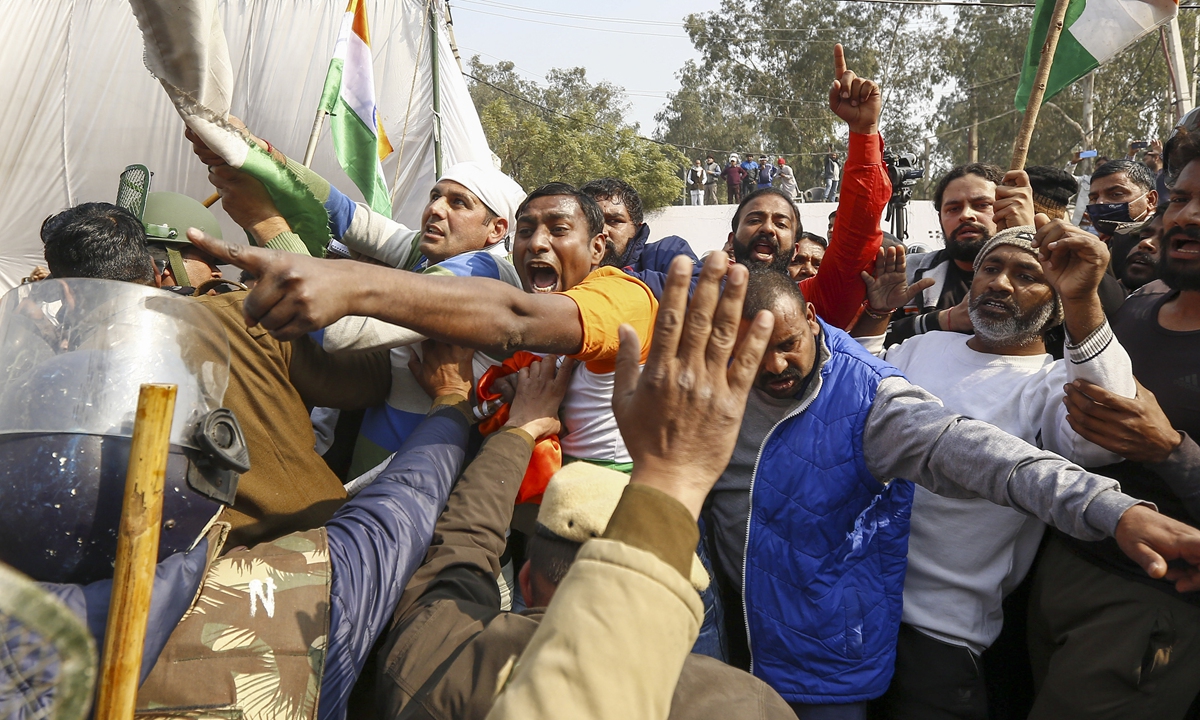
Police try to stop local residents as they clash with farmers who continue their protest against the central government's recent agricultural reforms blocking a highway at the Delhi-Haryana state border in Singhu, India on Friday. Photo: AFP
How can a country improve people's livelihood and properly deal with the public opinion while developing the economy and advancing reforms? How to reach a balance between fairness and efficiency? Indian farmers' protests over the past few months have shown that these questions are common issues in maintaining social stability.
Farmers' protests are still going on in India. In response, the Indian government suspended mobile internet services in several areas around New Delhi where the farmers are protesting new agricultural laws. The Indian government said the internet shutdown would continue until Sunday night to "maintain public safety."
New Delhi is well aware of the lessons from over a decade of unrest: from the 2010 Tunisia street demonstrations which triggered the turbulent situation in West Asia and North Africa, to the street protests in Belarus, Kyrgyzstan, Thailand and the US in 2020. These were all exacerbated by mixed factors of online media, domestic economy and social governance that became time bombs detonating social crises. With additional destabilizing facets, there will be a higher probability of crises and the damage will be more serious.
Therefore, as the Indian farmers' protests intensify, the Modi administration had chosen to suspend the internet and strengthen network media control in order to prevent the protests from affecting social stability and impacting the foundation of governance.
The Indian government has repeatedly used internet shutdowns to control protests. In 2019, the internet was shut down for about 100 times in India. Like the recent protests in many countries, farmers' protests in India are also mainly organized through social media. But such frequent network shutdowns show that the Modi administration does not have too many ways to deal with such crises. All it can do is simply shut the internet down.
The Modi administration believes that the new agricultural laws benefit the country and the people. The laws allow farmers to directly sell agricultural products and other crops to the private sector. This supposedly reduces the intermediate links of food circulation, and improves India's agricultural production through the market, ultimately improving farmers' livelihood. But the Indian farmers don't see it this way. In addition to the Indian government's lack of soliciting opinions on the laws, there are two other reasons why the farmers are strongly protesting against the laws.
One reason is the encouragement behind the curtain by some agricultural commodities brokers who have been chartered by the Indian government. These brokers were worried about their positions and interests and thus colluded with each other to form special interest groups. The other reason is the push from opposition parties in India, which have aimed to take advantage of the event to blow a strike to the Modi administration.
Relying on its majority in parliament, the ruling Bharatiya Janata Party quickly passed the farm bills by voice vote disregarding the oppositions' appeal for further discussion. This has become an excuse by the opposition groups to attack the Modi administration, accusing it of acting against farmers and democracy.
The farm bills can be viewed as a continuation of Modi's measures of economic and social development. These are defined with tough politics and high stakes publicity.
But the protesters won't concede easily to Modi's strong-arm tactics, and the crisis will not be settled in a short time.
Previous cases demonstrate that India's development doesn't necessarily benefit basic-level Indian people. Agriculture in India is dominated by small-scale farms, 80 percent of which have less than 2 hectares of land. It is difficult to achieve economies of scale with futures like this. Moreover, agricultural facilities including logistics and storage in rural areas are severely underdeveloped. In this context, farmers find it hard to avoid being exploited by ruthless brokers. From this perspective, given India's long-term development, it is somewhat biased to plainly accuse Modi of ignoring farmers' interests.
Simultaneously assuring fairness and efficiency is fundamental for a country to maintain social stability while it develops its economy, promote reforms, and properly addresses people's livelihood demands. This is what the protests triggered by the farm bills in India have demonstrated. And this is a world-class puzzle.
Given the complexity of India's political system, multiparty politics, and religious features, even seemingly simple reforms often affect the whole country. Even a political strongman like Modi is having his hands tied. He is being forced to stop while trying to solve long-term economic and social knots.
The author is director of the research department at the National Strategy Institute at Tsinghua University. opinion@globaltimes.com.cn
